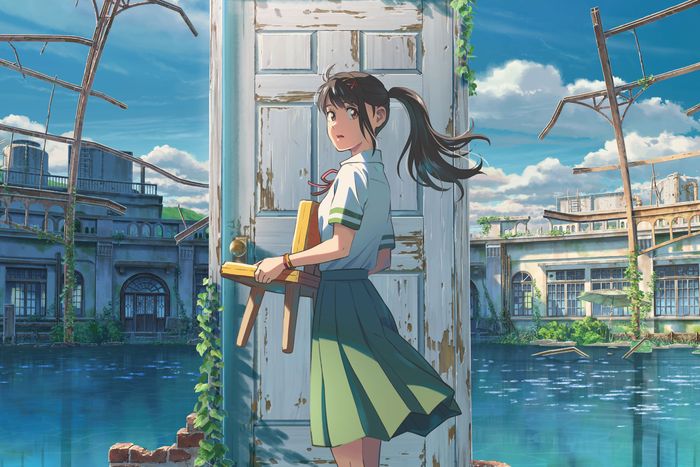
Makoto Shinkai’s Suzume is an openhearted romantic adventure about inheriting a damaged planet.
Photograph: Crunchyroll
To make animated films in Japan is to dwell in the shadow of Hayao Miyazaki, and Makoto Shinkai has been ducking comparisons to the famous artist given that his 2016 hit Your Name surpassed Spirited Away at the global box office environment. In his new film, Suzume, though, Shinkai surrenders to the inescapable by placing his teenage heroine in pursuit of a magical conversing cat named Daijin. Daijin is broad-eyed, lovable, and decidedly Ghibli-esque — like a sinister sibling of Jiji from Kiki’s Supply Support, specified that wherever he goes, disaster appears to comply with. But if Daijin is a nod to the king of Japanese animation, he’s also a reminder of just how various Shinkai’s operate is in how it blends magical experience with modern facts. Suzume normally takes location in a universe where people today have watched Miyazaki’s movies and write-up, “OMG, I come to feel like I’m in Whisper of the Heart!” as the caption on a photo of Daijin on the teach, leaving a trail of social-media posts for Suzume (Nanoka Hara) and her companion Souta (Hokuto Matsumura) to follow across the place. That grounding in the existing is 1 explanation Shinkai is these types of an unbeatable purveyor of untrammeled youthful emotion. Suzume is not timeless — it is quite significantly about its instant, about coming of age in a contracting Japan whose long term is unclear.
It’s also about saving the working day and slipping in appreciate underneath the skies that are Shinkai’s signature: striated with feathery clouds, strewn with stars, supplying a vast gradient of blues and purples. If Shinkai’s protagonists start off in worlds marked by mundane textures — like the aspects of the dazzling, cluttered property that 17-calendar year-previous Suzume life in with her aunt, Tamaki (Eri Fukatsu), in a seaside town in Kyushu — those skies characterize the promise of grandeur. That grandeur arrives in Suzume’s everyday living thanks to a brush with a passing stranger as she’s headed to school a single morning. A younger person who’ll inevitably introduce himself as Souta asks if there are any ruins close by, telling her, “I’m searching for a door” on Suzume’s suggestions, he heads toward an deserted village in the vicinity of the mountains. Unable to prevent wondering about the weird face (and the guy’s attractiveness), she follows him to the wreck of the aged spa town, and finds, as promised, a doorway in the center of nowhere that opens on to a twilight landscape she can see but can’t get to, as well as a statuette that transforms into Daijin and hops absent. That other world turns out to be house to a huge worm that keeps trying to make its way into ours, where it threatens to crash into the floor and trigger earthquakes. And Suzume has unknowingly weakened the obstacles retaining it absent.
That worm is a consider on the huge catfish that, in myths, life below Japan and results in seismic disruptions whenever the god tasked with keeping it down with a stone slips in his obligations. But it also provides to thoughts Haruki Murakami’s “Super-Frog Saves Tokyo,” in which a downtrodden salaryman is frequented by a large frog who asks for his help battling a worm underneath the city in order to cease it from, indeed, creating an earthquake. Like the protagonist of that brief tale, Souta turns out to have an unremarkable lifestyle outside the house of his duty to find out and shut magical doorways that, when open, give the worm a likelihood to wreak havoc. Even though Souta’s substantially hunkier than the salaryman, he also spends substantially of the film reworked into a child’s wood chair, an amusing indignity for a swoony enjoy interest. As Suzume and Souta (in chair kind) chase Daijin throughout the state, they try and from time to time fail to halt the normal disasters erupting together the way, but their acts of bravery and sacrifice are invisible to everyone about them.
Catastrophe runs via the movie like silvery scar tissue — Suzume’s mother died in the 2011 earthquake — but behind that is the a lot more gradual disaster of the shrinking populace responsible for so several of the abandoned parts where the worm is equipped to escape. Countering this decrease, in the film’s loveliest thought, is the group and link Suzume gets from the strangers who enable her along the way, and from the exasperated but loving aunt who elevated her. As in Shinkai’s final film, Weathering With You, Suzume is about youthful men and women who’ve inherited duty for a crumbling environment they have to hazard everything to conserve. But it is also a tribute to the mundane — to Souta’s cluttered but cozy scholar apartment, to the ramshackle pink convertible his pal Serizawa (Ryunosuke Kamiki) drives, to the crimson-confronted buyers at the Kobe bar Suzume ends up paying a night time in, to the individuals jogging along with the river or producing their way home from work at the finish of the working day. Suzume might be a fewer successful romance than some thing like Your Identify — it is tricky when fifty percent of your most important pairing is a piece of furnishings — but that is since its true like tale is with the things of daily everyday living, generating it nearly unbearably inviting and well worth fighting for.
See All
